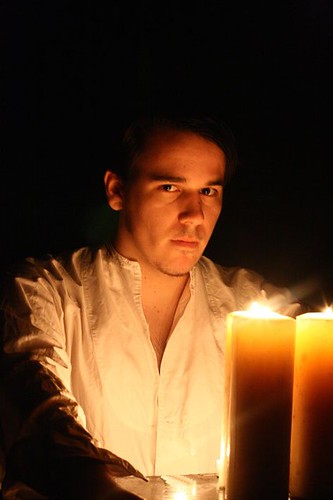Æ Review – Burke
* * *

Andrew Hainey as William Burke in Caroline Dunford’s Burke from Siege Perilous. Photo: Gary Daniell Photography
The GRV
By Thom Dibdin
Darkly brooding, Caroline Dunford’s new play about Edinburgh’s serial murders, Burke and Hare, is given an atmospheric production by Siege Perilous, in association with West Port Productions.
Set in the prison cell from which Burke was to be taken to his death, Andrew Hainey creates him as a man possessed by the enormity of his own deeds. His gaoler, one Captain Rose who is there to stop Burke from taking his own life, has become equally obsessed in trying to understand Burke’s motives.
In a nearby cell, Hare is waiting to find out when he will be released after turning King’s evidence. Gregor Firth is quick to give him a rather more vicious, self-serving appearance than Hainey gives the complex, shifting Burke.
Which is the crux of the matter. Burke, far from being the hapless patsy who took the fall for his more intelligent conspirator, is a mercurial entity whose recollections of what happened between himself and Hare, and the nature of their killings, are never consistent from one telling to the next.
Director Stuart Nicoll, who is also credited with concept and original idea for the play, gives this fascinating idea space to grow.
While Mark Kydd keeps the Captain barely stoic as he lets his disgust break through his gaoler’s demeanour, Hainey’s Burke manipulates him with ease. Relating how various murders came about the truth seems obvious – until Rose visits Hare and all becomes incoherent again.
There’s a little too much attention to the historical minutiae – some of the background facts don’t drop as smoothly into the plot as they might. And there are moments when you wonder whether the analysis of what is going on isn’t just a little too 21st century, rather than a reflection of early 19th century ideas and attitudes.
But the main problem, ironically, is that there is simply not enough of it. Siege Perilous pride themselves in bringing fringe theatre to Edinburgh outside the Fringe itself. This would certainly sit very well in a one-hour slot in August, but equally, Caroline Dunford could add in an extra half an hour.
This would both expand the content and deepen her exploration of the slippery, dangerous relationship between Burke, Hare and their partners. And which is not exactly a criticism, just to note that the hour slipped past very quickly indeed.
There are elements of the production which could be tightened up a fraction: Fiona Rutherford’s charming incidental music is used just a little too much and is rather too fulsome in the opening scenes; while the tricks of Daisy Seymour’s lighting design don’t always come off as perfectly as they might.
All told, however, this is a strong, enthralling production with three excellent performances,
Run ends Saturday 20 November
ENDS




















